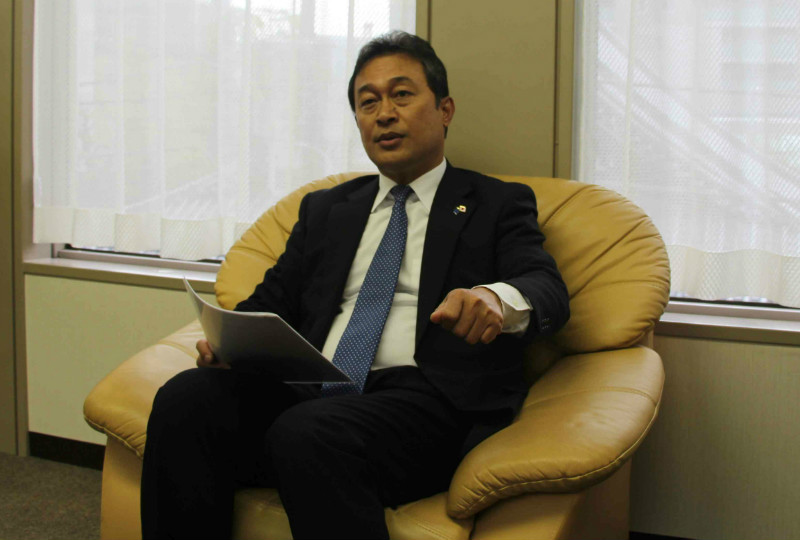Interview with FSM Ambassador to Japan

Q1. What about the Pacific Alliance Leaders Meeting are you looking forward to?
There are two things I am looking forward to. The first is proving what the past six meetings have shown-that is the strengthening of the friendship between Japan and the Pacific Islands region. The second is deciding the direction of the region and taking steps to keep moving ahead together, and to produce concrete results at the PALM7 meeting.
Q2. Having the PALM7 meeting in Fukushima sounds like a way to support the revival of the area after the earthquake and tsunami. Micronesia was just hit the other day with a very destructive typhoon; what do you think the meaning of Micronesia participating in the meeting as nation that is also susceptible to natural disasters?
Even though we have experience with natural disasters, the size is incomparable. On top of improving policies and response to natural disasters, this is an opportunity to share and learn from ours and others’ know-how. The Federated States of Micronesia has many things to learn from Japan, and I hope to have a positive exchange of opinions during the meeting.
Q3. Unfortunately, the damage caused by the typhoon in Micronesia was not largely picked up by the media in Japan. I feel that although Micronesia and Japan share a long history, the number of people who show interest is small. What is your opinion on this?
On March 29th, Typhoon Maysak hit the State of Chuuk in the Federated States of Micronesia, and then the State of Yap. Both areas are suffering from large damages, but the news was not widely broadcasted in Japan.
However, there were many people who heard of the typhoon through online news sites and contacted us and started to collect donations. The Japanese government also gave us immediate support and acted quickly, which we are very thankful for.
Q4. What are your thoughts on the possibility of talented workers leaving the islands and going to the U.S. under the Compact of Free Association, leading to a population outflow?
I believe there are two sides to this. The first is the negative side of a population outflow. 17 percent of the population outflow is headed towards the U.S. This is because of the limited education and work opportunities available in Micronesia.
However, if you look at the positive side, it’s a plus for Micronesia and the regional community if these men and women who go abroad come back to Micronesia and use the knowledge they gained out of the country. If people who received a higher education come back and use their expertise for the good of the community and local people, then a population outflow will not always be a negative occurrence.
-There is a problem of a brain drain, but are Micronesian students returning after their study abroad?
That’s a very big problem for us. Naturally, if you want a higher income more people will continue to live overseas. We cannot make decisions for them as a government, but we have to maintain their motivation while studying abroad and also get them to use their newly acquired knowledge back home. This is a challenge we will have to continue to think about.
Q5. It is said that because the Pacific Island nations are scattered, their economies are not functioning well. What approach do you think is necessary regarding this problem?
It’s true that the Pacific nations are far from the world’s central market. However, we can use those limited resources and give it added value; we are aiming to sell products that are rare and sold only in one place.
One of the challenges we’re facing in doing this is that Japanese technological aid and support is indispensable. In the Federated States of Micronesia, the fishing and tourism industries are two fundamental pillars we rely on. In order to develop and make these industries successful, we have to actively attract Japanese investment and give effort in cooperation and support.

(From left Ambassador Fritz, Ms. Otaka)
WHAT'S NEW
- 2025.1.12 UPDATE
PROJECTS
"Barbados A Walk Through History Part 15"
- 2024.12.4 UPDATE
PROJECTS
"Barbados A Walk Through History Part 14"
- 2024.9.17 UPDATE
PROJECTS
"Barbados A Walk Through History Part 13"
- 2024.7.30 UPDATE
EVENTS
"408th Lecture Meeting Regarding Global Issues"
- 2024.7.23 UPDATE
PROJECTS
"Barbados A Walk Through History Part 12"
- 2024.7.9 UPDATE
ABOUT
"GREETINGS FROM THE PRESIDENT JULY 2024"
- 2024.7.4 UPDATE
EVENTS
"APIC Supports 2024 Japanese Speech Contest in Jamaica"
- 2024.6.27 UPDATE
EVENTS
"407th Lecture Meeting Regarding Global Issues"
- 2024.5.21 UPDATE
EVENTS
"406th Lecture Meeting Regarding Global Issues"
- 2024.5.14 UPDATE
EVENTS
"405th Lecture Meeting Regarding Global Issues"




